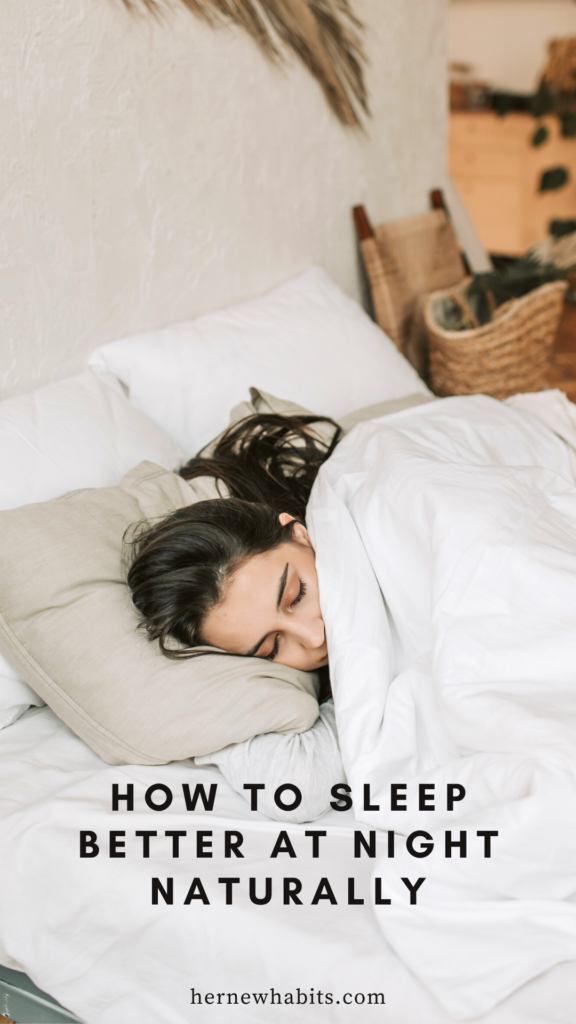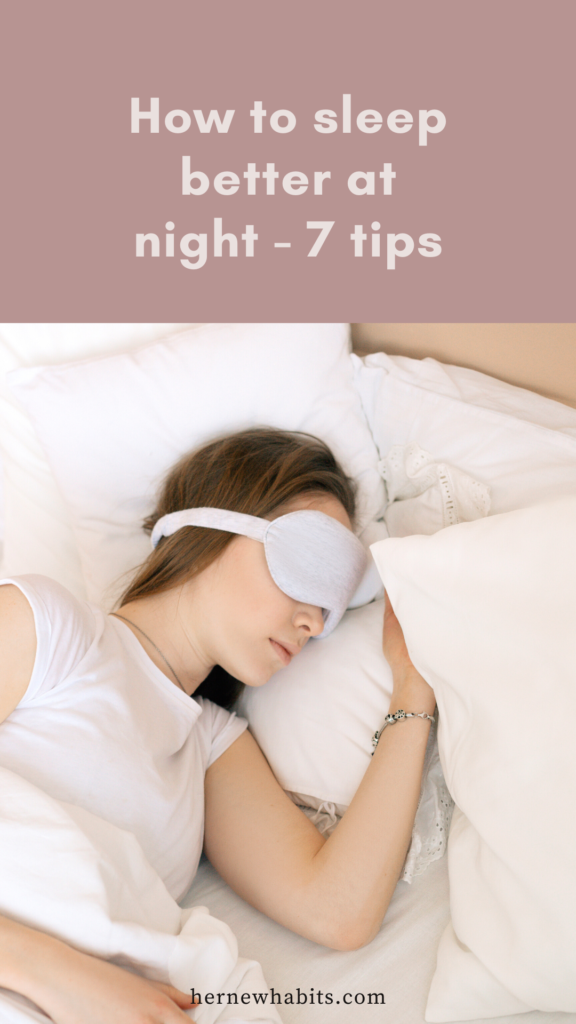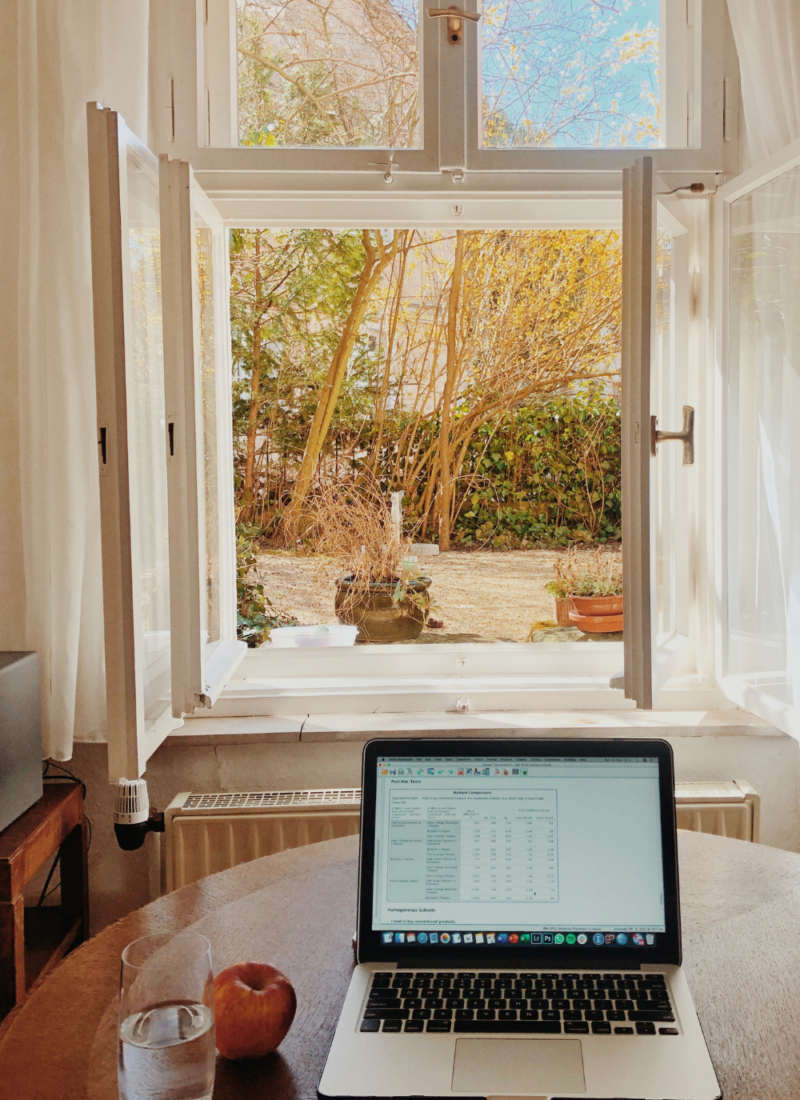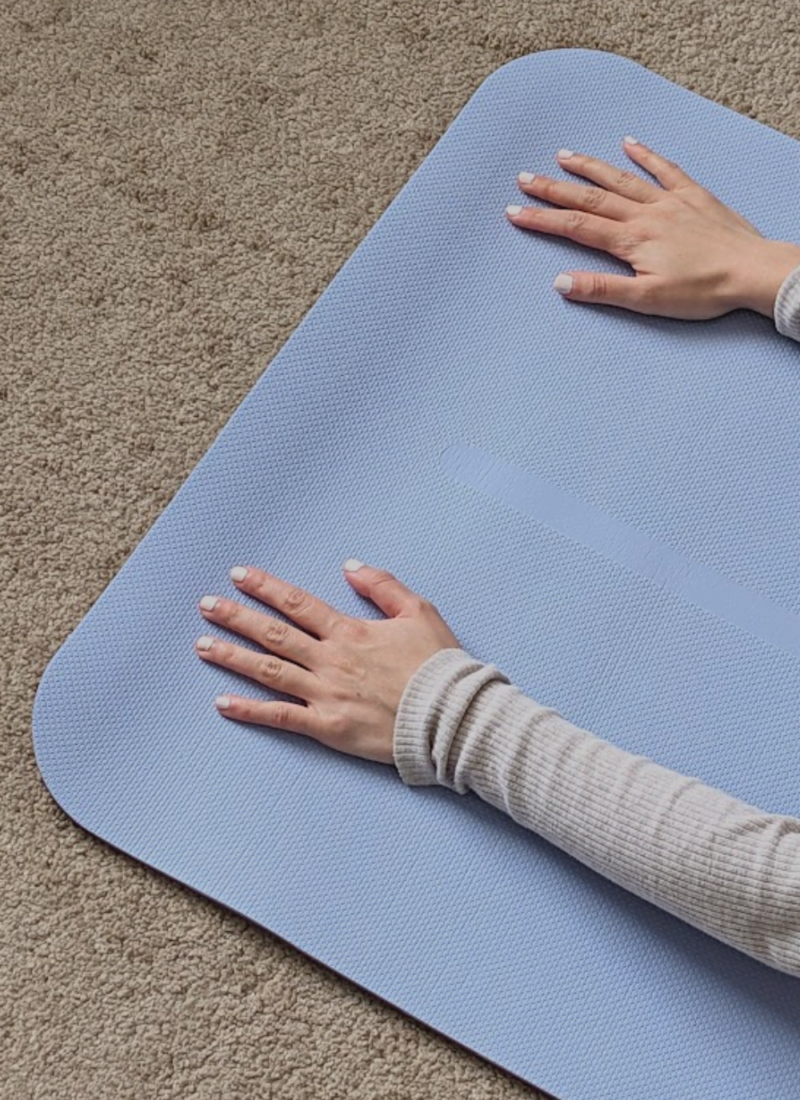A good night’s sleep helps your body recover from the day and prepare for the next, which is why it is essential that you acquire or maintain healthy sleeping habits. In this post you will find 7 tips to help you sleep better at night naturally.

How to sleep better at night naturally
When you sleep, your entire body enters a state of recovery and relaxation. Getting a good night’s sleep is essential to your survival, and just one bad night’s sleep can create negative effects on your overall health, including poor concentration, fatigue, irritability, brain fog, mood swings, and more.
Healthy sleeping habits are generally known as sleep hygiene and can be improved by changing a few things in your lifestyle. Depending on your situation, your social life and your work these changes can be more complicated, but keep in mind that getting enough sleep and having quality sleep is important to perform well in your daily activities.
Why is it important to sleep better at night naturally?
Poor sleep patterns are associated with diabetes, high blood pressure, obesity, heart disease, stroke, and mental health problems.
Many of these diseases only appear after years of poor sleep habits, which is why it is so important to review your routine even if you have not been diagnosed with any of them until now. Identify if you are getting enough sleep for your age and conditions, because if not, you need to make changes in your routine to achieve the time you need to sleep.
A study in the Australian population found that most people experience sleep difficulties such as waking up too early or during the night and not being able to go back to sleep. Any of these signs could mean anything, it could be from stress caused during the day or the foods you ate but start by checking your sleeping habits because that may be the reason why you can’t sleep better at night naturally.
How can you sleep better at night naturally?
Getting enough sleep is important for everyone, regardless of their age. If you are not getting a good night of sleep there are a few things you can do before bedtime to change that. Check on your routine and see which ones you are missing and one by one start incorporating them in your daily activities. Don’ t try all of them at the same time because it won’t work.
Change takes time and you want to make sure you are doing it in the best way. Also, make sure to try the activities that fit your schedule and lifestyle, because some of this may not make sense if you work during the night. These tips are for people who work during the day and can sleep during the night.
No. 1 Go to bed at the same time
Your internal clock has to be in sync for you to have a better sleep experience, and to do that you have to go to sleep and wake up at the same time every time. You can tell for yourself, choose a time that you feel is right for you and that fits into your work, social life, and family schedule.
Another option is to use this calculator so you know what time you should go to bed. It is simple to use! Enter your age and the time you want to wake up and the system will calculate the best time for you to go to sleep. Depending on your age, you will need more or less sleep than you think, and the Center for Diseases and Prevention (CDC) created a simple table with the hours you need to get enough sleep if you want to do the calculation yourself.
The CDC’s recommended amount of sleep for adults (18-60 years old) is 7 hours. If you sleep less and you don’t have any health problems, you should review your daily activities to find out what causes you to sleep less.
No. 2 Eat at least two hours before bed
Eating different foods throughout the day is crucial to your overall health. Food gives you all the nutrients and energy to stay active and perform well throughout the day. What is also important to get the full benefits of food is knowing when to feed your body.
When you eat, your body begins a huge process that involves different parts to digest food and distribute vitamins and nutrients to each part of your body. After you finish eating is when your body does most of the work so it’s normal to give it a rest.
When you go to sleep 30 minutes to an hour after eating, your body has to focus on two processes: digesting the food and preparing to fall asleep. Both of these activities are important to your body, so they involve many different parts. This is why you find it difficult to fall asleep immediately after a meal. Choose to eat at least two hours before bed to prevent this from happening and so you can sleep better at night naturally.
No. 3 Stay away from caffeinated or alcoholic beverages
Alcohol and caffeine are two ingredients that create a high level of stimulation in your body. This response in your body will activate it and will not let you rest during the night, and if you fall asleep early, you’re more likely to wake up during the night and have a hard time getting back to sleep.
If you are very sensitive to these two components, there are other things you can do if you still want to drink something before bed. Instead of drinking coffee or alcohol, opt for herbal teas, hot cocoa, or water. These are better options if you want to sleep better at night naturally.
Can’t go to sleep without having a glass of wine? Try to drink at least two hours before bed and with a meal. That way, by the time you’re ready to go to sleep, the effects of the alcohol will have lessened, and you’ll be able to sleep better. But then again, if you can stay away from it, that’s even better.
No. 4 Turn off all the lights in your room
Getting a good night’s sleep sometimes involves simple things like keeping your room dark, choosing a comfortable temperature, and wearing comfortable clothing. By doing this, you help your body prepare and sleep better at night naturally.
The lights from our phones, computers, and televisions are not good for our eyes, and they also overstimulate our brains while we use them. To ensure that you sleep well, it is necessary that you leave your electronic devices aside, in another room if possible, that way you give all your senses a break and you can relax.
Cover your eyes if you think it’s necessary. For many people it is not easy to keep the room completely dark, so the easiest way to keep the light off is to cover your eyes. If you’re not used to using the cover, give it some time. It can be difficult at first, but with a little practice you won’t notice it later on.
No. 5 Have a relaxing night routine to sleep better
Sleep quality is essential for productivity, emotional stability, and overall health. It won’t matter if you sleep for 7 hours if you wake up at different times during the night, or never reach a deeper stage of sleep. It’s important to get enough sleep, but also to get the best sleep possible during that time.
Having a proper night routine helps put your body into the relaxation mode it needs to get a good night’s sleep. The activities you can do before bed depend on your tastes, your lifestyle and your needs.
There are many things you can do before bed to get a better night’s sleep naturally. Some options are stretching, meditation, taking a warm bath, doing a simple skin care routine, or reading. You don’t have to do them all to get a great night’s sleep, just choose the ones that make you feel good and that you think will have a good impact on your quality of sleep.

No. 6 Get enough physical activity throughout the day
Staying active during the day is important for different reasons. It supports your immune system, helps you focus better, and reduces mood swings. But getting enough physical activity during the day also has big benefits on sleep quality and duration.
When you eat, you get all the energy your body needs to do all the things you want. Through the activities you do during the day this energy is used. If you are not active enough during the day, this energy remains stored in your body and if you have not used it before bed, it will be very difficult for your body to relax.
When you exercise, walk or do any other activity that helps your body release all the energy you get from food, at the end of the day your body is more likely to fall asleep easily. One of the best things you can do is make sure you start your day moving your body. Take a 15-minute walk before work or stretch while you make your coffee. Simple movements will add up to the end of the day and you will be able to sleep better at night naturally.
No. 7 Take naps of no more than 30 minutes
Many people take naps during the day, especially in the afternoon after lunch. It is a common practice in many countries and for some people it is unavoidable if they did not sleep well the night before or had a long day at work. What not many people know is the difference between long and short naps and how that affects your health.
One study found the importance of keeping daytime naps under 30 minutes to reap the most benefits. A 30-minute afternoon nap increases your productivity, helps you learn better, and regulates your mood. In order to take short naps, you have to practice and train your body to wake up at the right time.
Long naps, on the other hand, are associated with low energy and productivity, and the reason is that they’re linked to sleep inertia, which will leave you feeling lethargic for at least 30 minutes after waking up from your nap. So, if you are thinking of sleeping during the day make sure it is between 10 and 30 minutes.
How can you incorporate healthy sleeping habits?
Adding habits to your routine isn’t always an easy task, but if you do it right you can enjoy the benefits of the new activity right away. You will see how your memory improves, your productivity increases, your energy level stays high during the day and your body and mind feel better in general.
Here are some things you can do to ensure you improve your sleep hygiene and start reaping the full benefits of a better night’s sleep naturally:
- Study your sleep: Use apps or keep a journal where you write for a week about how your night went. Did you sleep all night? Did you wake up and go to bed at the time you wanted?
- Calculate your best time to sleep and wake up: The general rule of thumb is to get at least 7 hours of sleep every night, but depending on your age, health, and lifestyle, this could change. Getting enough sleep is different for everyone, so you need to identify the best time for you.
- Identify which habits you lack: start with the habits in this post, review the ones you have and the ones you don’t, and start adding the ones you think can benefit you. Start incorporating one by one, don’t do it all at once.
- Reward yourself: Make sure to celebrate when you’ve had a good night’s sleep and be aware of how different you feel after that good night’s rest. When you recognize the good effects you’re getting, you’ll be more likely to stick with the new routine you’re creating.
Conclusion
Having healthy sleep habits is essential for your overall health. Poor sleep patterns are linked to low productivity, weight gain, low energy, mood swings, and a weakened immune system. So, make sure you do what it takes to sleep better at night naturally.
In this post, you’ve learned easy ways to ensure you get a consistent, good night’s sleep naturally. Most of these healthy sleep habits are aimed at people who have regular work hours (during the day) and not those who work at night as they will need another approach. Also, different health conditions can make it more difficult to get a good night’s sleep, even if you have the best sleep hygiene, so keep this in mind.
Comment below what you do to get a great night’s sleep naturally.




Deanna | Life By Deanna says
The exercise one is soooo helpful I swear since I started working out more I sleep so much better because I tire myself out haha great tips!
Nury - Her New Habits says
Hi Deanna, thanks for your comment. That’s works so well for me too. I’m glad that you like these tips 🙂